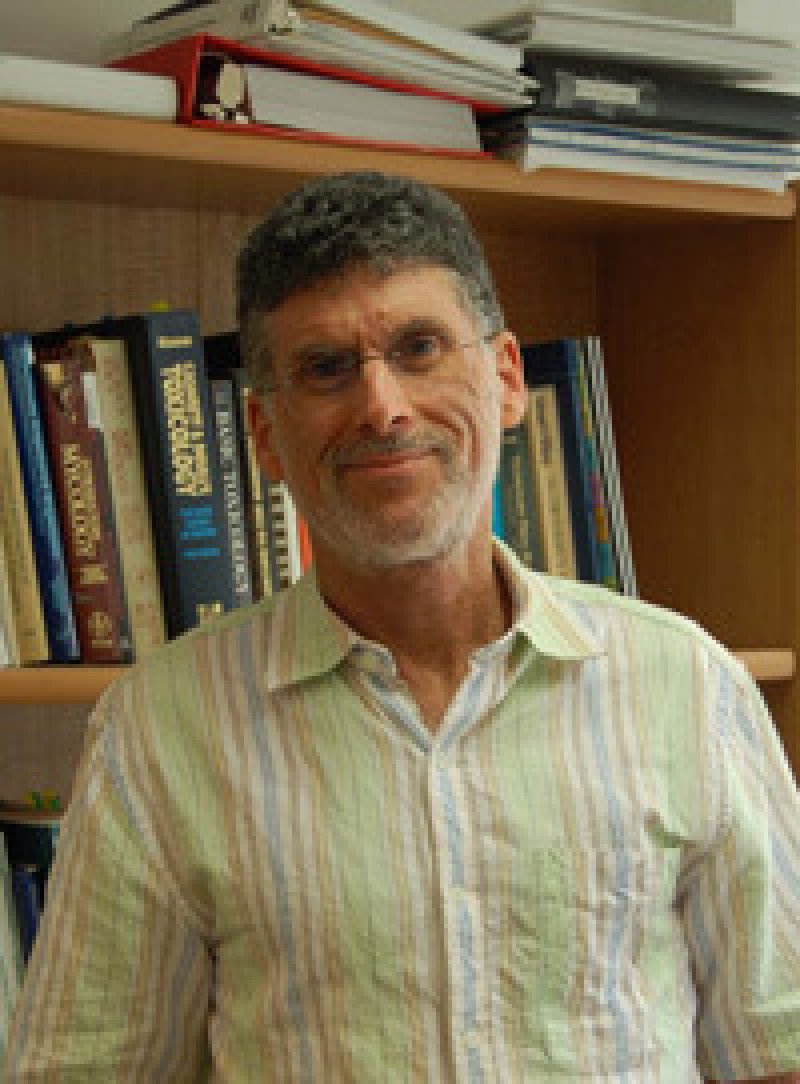Doug Gurian-Sherman (b 1955) is a consultant on agriculture with Strategic Expansion and Training in Minneapolis. He was previously senior scientist and director of sustainable agriculture at the anti-GMO litigation Washington-based NGO Center for Food Safety[1] from 2014-2017. He rejoined CFS after previously serving for years as a senior scientist in its Food and Environment Program.
Gurian-Sherman previously served as senior scientist at the Union of Concerned Scientists. Ricardo Salvador, Director of UCS Food and Environment Program and Gurian-Sherman’s former supervisor, has said to at least one prominent journalist that a key reason for his departure was the organization’s growing concern about the ideological stands Gurian-Sherman had taken in his writings and public statements on agricultural biotechnology and a belief that the UCS needed to move in a ‘less confrontational’ and more empirically-based direction. Salvador and UCS Executive Director Kathleen Rest sent the GLP a letter denying that characterization. The GLP asked Salvador to address these issues directly but received no answer.
Career
From 2004 to 2006, Dr. Gurian-Sherman was senior scientist at the Center for Food Safety in Washington, DC. Previously, he was founding co-director and science director for the biotechnology project at the Center for Science in the Public Interest (CSPI). He also worked at the U.S. Environmental Protection Agency (EPA) where he was responsible for assessing human health and environmental risks from transgenic plants and microorganisms and developing biotechnology policy. Before joining the EPA, he worked in the Biotechnology Group at the U.S. Patent and Trademark Office. From 2002 to 2005, Dr. Gurian-Sherman served on the Food and Drug Administration’s inaugural advisory food biotechnology subcommittee. Gurian-Sherman holds a doctorate degree in plant pathology from the University of California at Berkeley. He conducted post-doctoral research on rice and wheat molecular biology at the U.S. Department of Agriculture laboratory in Albany, California.
Union of Concerned Scientists
The Union of Concerned Scientists (UCS), which conferred on Gurian-Sherman his public credibility, is, in on the issue of crop biotechnology, Greenpeace with a Ph.D. Its role is to convince media, regulators and legislators that the environmentalists’ conclusions that it supports are backed up by a scientific consensus (hence the “union” and “scientists” in its name). Originally a no-nukes group, UCS has grown into a player on everything from livestock antibiotics and DDT to electric cars and greenhouse gases. It has historically had a significant anti-biotech online platform led by scientists, such as Margaret Mellon, Jane Rissler and Doug Gurian-Sherman. UCS, under Gurian-Sherman, denied there is a scientific consensus on the safety of GMOs despite the fact that every major independent science agency in the world of note has publicly reached that conclusion.
UCS’s objections to GMOs have gone far beyond roundup-ready soybeans and biotech alfalfa. It also has objected strongly to biopharma crops, argued that anti-hunger legislation should be “technology neutral,” and painted GMOs as “seed contaminators” because of pollen drift. UCS typically objects to the use of crop yield as a critical metric of GMOs’ success and necessity, focusing attention instead on “lack of income to buy food, lack of infrastructure like roads to get products to market, trade policies that disadvantage farmers in the developing world,” etc. But even on crop yields, UCS doesn’t cede any ground: In 2008 the group published its last big anti-biotech report, titled “Failure to Yield: Evaluating the Performance of Genetically Engineered Crops,” which is cited as canon by anti-GMO and pro-labeling activists such as Gary Hirshberg, founder of Stonyfield Farms and the Just Label It campaign.
According to a top UCS official, after parting ways with Gurian-Sherman, the organization is planning a significant break from what most independent scientists believe has been the organization’s anti-science, highly ideological campaign agricultural biotechnology. Ricardo Salvador, while not without his own criticisms of aspects of genetic modification in agriculture, has spoken favorably about GMO yeasts that produce omega-3 fatty acids, a position that Gurian-Sherman would never have espoused. When or if this transformation will take place is unknown. The UCS website that focuses on crop biotechnology still contains many statements that mainstream scientists would consider erroneous or exaggerated.
When GLP asked Ricardo Salvador, who has told numerous people that he will guide the transformation in a less antagonistic direction, whether Gurian-Sherman was fired or encouraged to leave, he did not answer directly but provided this statement:
Doug is an esteemed colleague, who produced a number of rigorous scientific analyses during his tenure with the Union of Concerned Scientists. His reports are featured on our web site and we stand behind them and the quality of his work as a scientist. We were very pleased that Doug was able to step into a position of leadership within the field, as Director of Sustainable Agriculture at the Center for Food Safety, and we anticipate that in the future we will continue collaborating with him on science and policy matters of mutual interest.
Quotes
On whether GMOs are a needed technology, from “Are GMOs Worth the Trouble” in MIT Technology Review:
- GMOs require years of field testing to ensure that the gene functions as expected, with no nasty surprises for farmers, under the varying conditions that a crop will face after commercialization.
- …all the current evidence suggests that breeding is more effective overall.
- Backers of GMOs also tend to downplay the unresolved challenges of the technology. One such challenge is the high economic concentration of the seed industry, facilitated by gene patents. Current uses of the technology also seem to encourage the expansion of industrial monoculture farming, with all its problems. And most of the pipeline for GMOs is more of the same—herbicide resistant crops that will exacerbate pesticide use.
On sustainability and GMOs:
There is a critical need to provide a science framework for our food production system. We cannot continue to farm using unsustainable industrial methods that waste scarce resources and degrade our environment and food quality, threaten pollinators and other beneficial insects, and contribute to climate change.
On unapproved GMO wheat discovery:
- According to Dr. Doug Gurian-Sherman from the Union of Concerned Scientists (UCS), illegal genetically-modified (GM) wheat has more than likely already spread to many other parts of the U.S. besides Oregon, which means that it may have also “contaminated” the greater food supply as well.
- “Somebody has been breeding this wheat, inadvertently for a number of years, whether a seed company or this farmer,” Dr. Gurian-Sherman is quoted as saying by Bloomberg.com. “I wouldn’t be at all surprised if there are a number of experimental genes that have contaminated and are happily being passed along at low levels in the food supplies of various crops already, but nobody’s testing. It’s really a ‘don’t look, don’t tell’ situation. We just really don’t know.” [2]
On Seralini GMO cause cancer in rats study claims:
- “The recent paper published in your journal by Séralini et al. has resulted in controversy. This has led to calls to retract the paper. I strongly reject such interference in the normal and accepted processes of science, and urge you to resist such pressure. Conceding to this pressure would be to controvert the expertise of your reviewers, who have accepted the Séralini paper as fit to publish. Retraction should be done only for clear instances of abuse, such as fraud, or where subsequent information clearly demonstrates that the paper does not meet scientific standards. Neither has been shown to be the case for the Séralini paper. In general, the methodology conforms to basic standards of biological experimentation. It also advances this field of study in being one of very few long-term feeding studies using a genetically engineered crop. While some of the results are equivocal, for example the lack of statistical significance in the tumour data, this is a common occurrence in research and can be addressed on its merits by public discussion and further research. This is not merely an issue of a single paper or author, but an example of what is now becoming a long pattern by proponents of a particular viewpoint attempting to pressure the science community to conform to its wishes. I have observed this pressure for many years, and find it corrosive to the open and unbiased functioning of the scientific process.”[3]
On impact of GM herbicide tolerant crops and pesticide use:
- This an extremely high figure which has been disputed but in the US, the biggest user of GM, pesticide use has gone up dramatically due GM herbicide-resistant weeds, warns Doug Gurian-Sherman of the Union of Concerned Scientists. “Millions of acres of glyphosate-resistant weeds are causing real harm, such as increased tillage that increases soil erosion,” he points out.[4]
On GE crops and potential health problems from UCS site, 9-2-2014:
- While the risks of genetic engineering have sometimes been exaggerated or misrepresented, GE crops do have the potential to cause a variety of health problems and environmental impacts. For instance, they may produce new allergens and toxins, spread harmful traits to weeds and non-GE crops, or harm animals that consume them.
On GMO safety in MIT Technology Review, citing the anti-GMO petition signed by activists affiliated with the anti-science NGO ENSEER, which includes Gurian-Sherman: It’s also worth noting that there’s no real consensus on GMO crop safety. Although many of the crops may well be benign, some could be harmful, prompting unresolved questions about the adequacy of current regulations.
Criticism
- On double standards and the Union of Concerned Scientists, Keith Kloor, Discover
- Union of concerned trolls, Random Rationality blog, Mary Mangan, PhD, Cell, Molecular, and Developmental Biology
- Does the Union of Concerned Scientists’ Doug Gurian-Sherman misrepresent GMOs? Jon Entine, Genetic Literacy Project
- It’s been a bad decade for Union of Concerned Scientists, Hank Campbell, Science 2.0
- ‘Union of Concerned Scientists’ are charlatans’, Tom Hartsfield, RealClearScience
- Union of Concerned Scientists failing on farming, Kevin Bonham, ScienceBlogs
- Metastasizing misinformation about GMOs and RNA: Ugly glare on Union of Concerned Scientists, Consumers Union, Jon Entine, Forbes
Bibliography & Resources
References
- 1 http://nathanwhite.cmail1.com/t/ViewEmail/t/C278E764256ACAA7/F469FC239F60C0CFC67FD2F38AC4859C
- 2 America’s wheat exports in crisis: Discovery of contaminated wheat from Monsanto trials only the beginning, by Ethan A. Huff, Mike Adams‘ Natural News, June 17, 2013.
- 3 Gurian-Sherman letter to the editor, not published but shared with GMO-Seralini advocacy group.
- 4 Illegal GM cotton spreads across India, by Latha Jishnu, Down to Earth, May 22, 2013.






























